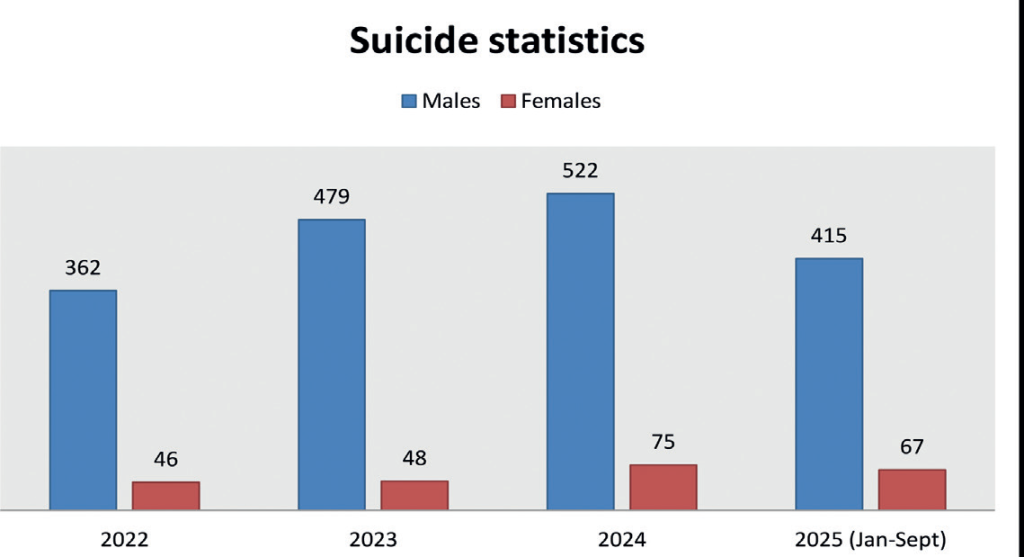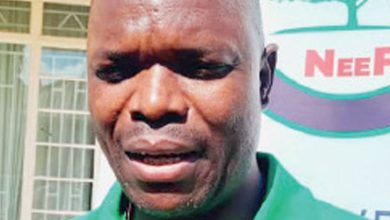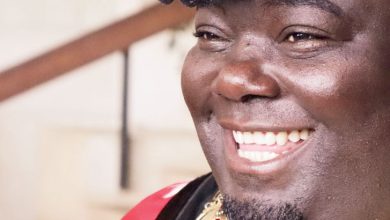Suicide crisis deepens now
Malawi is struggling to contain a devastating mental health crisis, with official police statistics revealing that at least 2 014 people have killed themselves between 2022 and September 2025. A psychologist has urgently labeled the rising self-inflicted deaths as a national crisis, worsened by the fact that the act remains a crime under current law.
The data reveals that those committing suicide are predominantly aged 20 to 39, the country’s most economically and socially productive age group and overwhelmingly male.
By breakdown, in 2022, 408 people committed suicide with the figure shooting to 527 in 2023. In 2024, 597 people committed suicide and between January and September this year, 482 people have already killed themselves.
This year’s figures are likely to increase, subsequently surpassing the previous year’s statistics.
By gender segregation, 362 males committed suicide in 2022 while females accounted for only 46 cases. The number of males committing suicide rose to 479 in 2022 with those of females slightly adjusting upwards to 48.
Then in 2024, 522 males killed themselves while females accounted for 75 of the suicide deaths.

Between January and September this year, 415 males had committed suicide while 75 females committed the act.
National Police deputy spokesperson Alfred Chimthere told Nation on Sunday during the week that those committing suicide are between the ages of 20 and 39.
The particular age range is considered as the most productive during a person’s lifetime.
Kamuzu University of Health Sciences clinical psychologist Dr. Chiwoza Bandawe said in an interview on Thursday that it is important to acknowledge that the situation is a crisis. He said denying that the situation is a crisis will result in more deaths.
He further said there is need for more spaces and groups to be created to allow discussions pertaining to suicide.
Bandawe said such groups and spaces need to have men, in particular, discuss the stressful situations they are going through and find practical solutions, among others.
“Change takes time, change is a process and what is very important is that as a country we need to recognise that these conversations need to keep happening,” said Bandawe.
“We need to educate people about what they can do, about where they can go and we need to train men about how they can handle their emotions, how to handle their feelings.
“So, we need to not just leave it in the hands of the professionals. We also need to reach out to religious leaders, teachers and to a whole range of community leaders so that they can be part of this conversation.”
A March 25 2025, a suicide fact sheet by World Health Organisation indicates that 73 percent of global suicides occurred in low and middle-income countries in 2021.
“Suicide is a serious public health problem that requires a public health response,” reads the fact sheet.
“With timely, evidence-based and often low-cost interventions, suicides can be prevented. For national responses to be effective, a comprehensive multisectoral suicide prevention strategy is needed.”
In August 2023, the Ministry of Gender, Children, Disability and Social Welfare stated it had developed and launched an engagement strategy to help address the situation.
This is in addition to strengthening coordination with the Ministry of Health, police and Judiciary to discuss and find solutions.
In an interview on Friday, Ministry of Gender, Children, Disability and Social Welfare spokesperson Pauline Kaude said they are making efforts to effectively deal with suicide.
She said the ministry continues disseminating and implementing a Male Engagement Strategy to enhance the participation and involvement of men and boys in addressing the issue.
The Male Engagement Strategy also looks at gender-based violence (GBV), HIV and sexual and reproductive health and rights.
Kaude said: “Strides have been made in disseminating the strategy in district councils and other channels. The strategy further promotes health seeking behaviours and reporting of issues or cases as a way of reducing suicidal thoughts and attempts.
“The ministry has also been conducting capacity building training for district service providers on essential services packages which has a component of mental health and psychosocial support for survivors of violence, including men and boys.”
Additionally, Kaude said the ministry has intensified awareness on GBV and mental health which will also be escalated during the upcoming 16 Days of Activism against GBV.
The 16 Days of Activism against GBV, which will this year be observed under the theme ‘Unite to End Digital Violence against all Women and Girls’, will run from November 25 to December 10.
In Malawi, suicide remains illegal as per Section 229 of the Penal Code which criminalises the act.
Reads Section 229 of the Penal Code: “Any person who attempts to kill himself shall be guilty of a misdemeanor.”
This means that under this law, anyone who survives a suicide attempt can be jailed for up to two years regardless of the personal crisis that drove them to the brink.
But mental health advocates have recently been pushing for decriminalisation of suicide on the premise that it does not deter others from committing the act—but rather that individuals who attempt suicide needs compassion and support.





